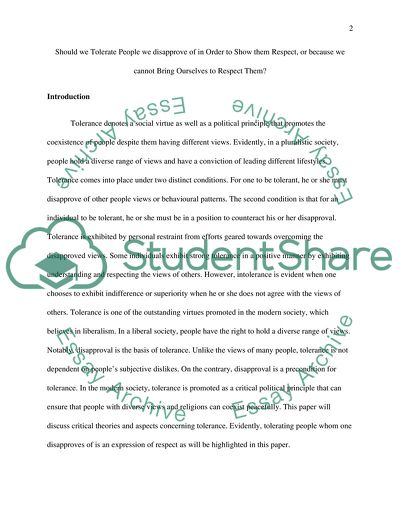Cite this document
(Should We Tolerate People We Disapprove of in Order to Show them Coursework Example | Topics and Well Written Essays - 2500 words - 1, n.d.)
Should We Tolerate People We Disapprove of in Order to Show them Coursework Example | Topics and Well Written Essays - 2500 words - 1. https://studentshare.org/social-science/1867021-should-we-tolerate-people-we-disapprove-of-in-order-to-show-them-respect-or-because-we-cannot-bring-ourselves-to-respect-them
Should We Tolerate People We Disapprove of in Order to Show them Coursework Example | Topics and Well Written Essays - 2500 words - 1. https://studentshare.org/social-science/1867021-should-we-tolerate-people-we-disapprove-of-in-order-to-show-them-respect-or-because-we-cannot-bring-ourselves-to-respect-them
(Should We Tolerate People We Disapprove of in Order to Show Them Coursework Example | Topics and Well Written Essays - 2500 Words - 1)
Should We Tolerate People We Disapprove of in Order to Show Them Coursework Example | Topics and Well Written Essays - 2500 Words - 1. https://studentshare.org/social-science/1867021-should-we-tolerate-people-we-disapprove-of-in-order-to-show-them-respect-or-because-we-cannot-bring-ourselves-to-respect-them.
Should We Tolerate People We Disapprove of in Order to Show Them Coursework Example | Topics and Well Written Essays - 2500 Words - 1. https://studentshare.org/social-science/1867021-should-we-tolerate-people-we-disapprove-of-in-order-to-show-them-respect-or-because-we-cannot-bring-ourselves-to-respect-them.
“Should We Tolerate People We Disapprove of in Order to Show Them Coursework Example | Topics and Well Written Essays - 2500 Words - 1”. https://studentshare.org/social-science/1867021-should-we-tolerate-people-we-disapprove-of-in-order-to-show-them-respect-or-because-we-cannot-bring-ourselves-to-respect-them.


